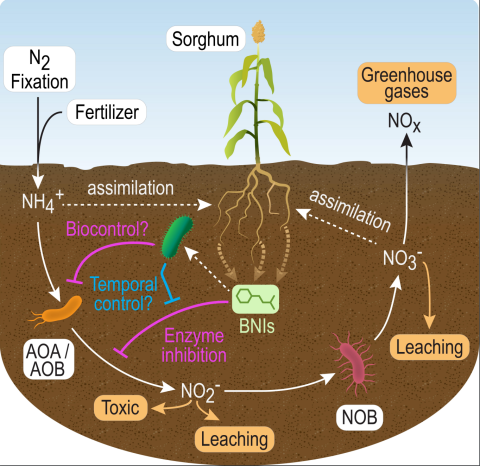Agriculture is the largest source of greenhouse gases (GHG) production. Conversion of nitrogen fertilizers into more reduced forms by microbes through a process known as biological nitrification drives GHG production, enhances proliferation of toxic algal blooms, and increases cost of crop production. Some plants reduce biological nitrification in soils by exuding a diverse array of biological nitrification inhibitors (BNIs) that inhibit the ammonium oxidizing microbes responsible for nitrification. Applying synthetic biology to enhance and transfer BNI production into food and bioenergy crops is a promising approach to reduce nitrification but the success of this strategy is contingent upon improving our limited understanding of BNIs mechanisms-of-action and degradation in the soil. We addressed this gap by investigating the previously unknown metabolic route through which a prominent class of aromatic BNIs known as phenylpropanoid methyl esters (PPMEs) are catabolized. While neither transcriptomics (RNAseq) or high-throughput functional genomics (RB-TnSeq) methods reduced the genetic search space for pathway discovery into a tenable number of genes, the combination of narrowed the search space to a collection of 4 proteins of unknown function.
Reference Citation
A novel phenylpropanoid methyl esterase enables catabolism of aromatic compounds that inhibit biological nitrification. Andrew Wilson, Elise Van Fossen, Ritu Shrestha, Valentine Trotter, Brenton Poirier, Andrew Frank, William Nelson, Young-Mo Kim, Adam Deutschbauer, Robert Egbert, Joshua R. Elmore. bioRxiv 2023.06.02.543320; doi: https://doi.org/10.1101/2023.06.02.543320
Projects (1)
Last updated on 2023-02-23T19:37:46+00:00 by LN Anderson PerCon SFA Project Publication Experimental Data Catalog The Persistence Control of Engineered Functions in Complex Soil Microbiomes Project (PerCon SFA) at Pacific Northwest National Laboratory ( PNNL ) is a Genomic Sciences Program...
Datasets
5







